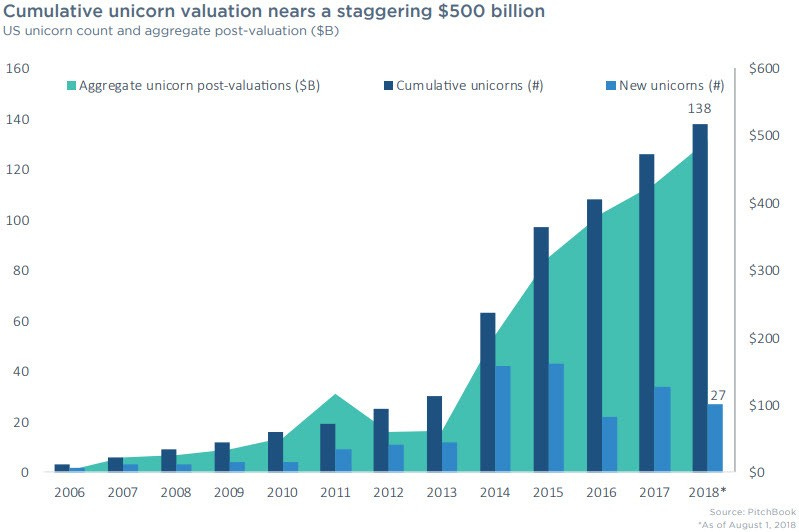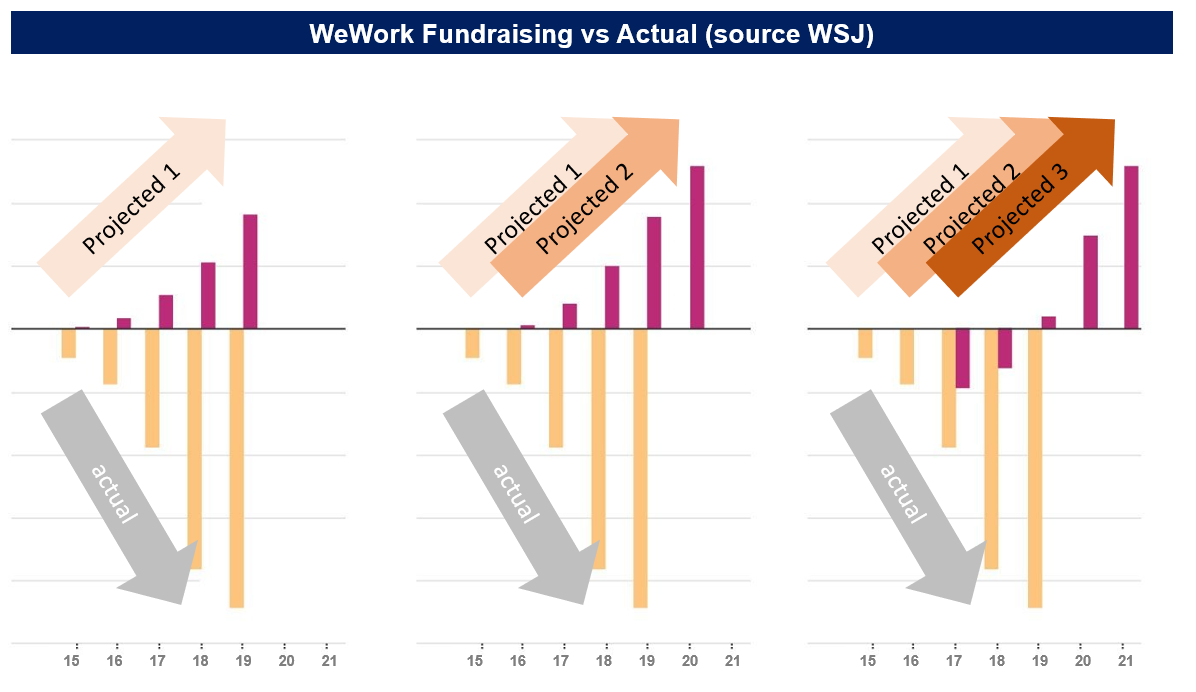Unicorn valuations are bad for your health -- the Prisoner's Dilemma of WeWork and Magic Leap; plus 20 key Fintech developments
Hi Fintech futurists --
In the long take this week, I look at why unicorn valuations can be destructive for the Fintech industry. While some companies do have incredible financial performance, much of the valuation premium in the private markets today is a negative Prisoner's Dilemma equilibrium, which leads to price compression, over-scaling, and problems with exit for everyone but the CEO. We look at this question through the lens of WeWork and Magic Leap, and the recent developments in the news about the economics of those companies.
The latest key updates on Fintech bundles, Crypto and Blockchain, Artificial Intelligence, and Augmented and Virtual Reality are below. Thanks for reading and let me know your thoughts by email or in the comments! Last but not least, these opinions are personal (or maybe made by a robot) and do not reflect any views of ConsenSys or other parties.
Long Take
Why are high valuations bad? You've heard me talk about how the trend of Fintech bundling, and the unicorn and decacorn valuations led by SoftBank and DST Global, are creating underlying weakness in the private Fintech markets. Of course, they are also creating price compression and consolidation in the public markets (e.g, Schwab/TD, Fiserv/First Data) across sub-sectors. But public companies are at least transparent and deeply analyzed. Private companies have beautiful websites, charismatic leaders, and impressive sounding investors. Often when you look under the hood, it's just a bunch of angry bees trying to find something to sting.

As Fintech venture investment continues to grow and the power laws of the web apply themselves to neobanks, roboadvisors and the rest, highly-valued private companies accumulate and consolidate. See: Now $500 million richer, $6B-valued Chime eyes acquisitions. According to Pitchbook, we have 140 or so multi billion dollar private companies since 2006 in play. Private means illiquid. Private means that the employees are frustrated that they have not sold any equity for a while. On the other side of the equation, selling that equity is taking longer and longer. The average time to an offering has gone from 3 years in 1996 to about 8 years in 2016. The amount raised in the private markets prior to IPO has similarly scaled from $12 million to $100 million. And that's clearly ignoring the economics of big platforms like Uber.


It's taking so long that several Silicon Valley players (e.g., Slack, Spotify, Asana) are trying to avoid IPOs entirely, and just place a direct listing. The SEC is frustrating this attempt for the NYSE, helping defend investment banking business as a result, but the direction of gravity is inevitable. Initial Coin Offerings, Initial Exchange Offerings, Security Token Offerings, various blockchain-based bond issuances, and the rest are showing the world what direct security ownership will look like in the future. But that's not our point today. Our point is that over-valuation is actually bad business for the companies involved.
Let's anchor in WeWork and MagicLeap. Two articles this week shed light on what happened behind closed doors, though notably both articles are behind paywalls: Dented Reality: Magic Leap Sees Slow Sales, Steep Losses and The Money Men Who Enabled Adam Neumann and the WeWork Debacle.
The core Magic Leap story is that the company burned $50 million a month and raised over $2.5 billion. After completing some heavy and interesting R&D efforts, it failed on commercialization -- selling no more than 6,000 of its augmented reality headsets for about $3,000 per unit. As a result, Magic Leap just kicked off a major pivot from a consumer gaming company to an enterprise productivity company. In part, this is because the enterprise AR market has seen some chunky revenue, in the form of a $500 million Microsoft HoloLens contract with the US military. Consumer headsets have seen slower adoption, with about 10 million units per year in total, including VR rigs. Outside of PokemonGo, AR has struggled.


Did it help Magic Leap to raise billions in capital, burn it down, and try to go all out in a market where there is no demand? You can see in the chart above that Consumer AR is not yet meaningful as a hardware category. It could end up being important for SnapChat, which already has a multimillion user footprint with built-in virality around content, fashion, and 3D rendered memes. It could be important for Apple or Google, which have a billion user footprint with hardware embedded across the entire world. Does $3 billion in venture funding really compare with a set of companies that print hundreds of billion in revenue by releasing the most innovative technology out there? All you've done with that much capital is prevented your acquirers from being able to afford you.


What new thing is there to say about WeWork? The WSJ article gave a few really interesting data points about how WeWork was positioning its revenue growth for each fundraise. The reality is they were sinking deeper and deeper into an economic black hole with every dollar raised, as the high level financials below show. But the WSJ plotted these actuals against the projections in the investment documents. You can see the rosy "up and to the right" arrow just moving along every year. Even as the net loss increased to $2 billion on $2.5 billion in revenue, the only thing changing from a venture capital perspective was the starting point for the model.


I can tell you with 100% certainty that every single entrepreneur trying to raise money does this exact trick. The main difference is that most people get to lose a few million, while Adam got to lose several billion and walk away with a $1.7 billion severance as compensation. At the end of it all, I don't really even think it was his "fault". Instead, this is the logical result of a blitz-scaling venture capital system, which creates a Prisoner's Dilemma environment for investors and operators both. The individuals in charge happen to represent the underlying qualities of the system in which they operate, but they are not special.
The machine is simple. The 2008 crisis has led to interest rates being artificially set to near zero for a decade. Technology and open data commoditized the returns in active public equity investing. Large insitutional investors, which normally hold meaningful allocations in both actively managed fixed income and equities, flocked to alternative investments in the form of venture capital and private equity. Private equity is a large asset class, and can generally absorb the capital, especially with cheap credit available. Venture capital is a small asset class and has ballooned, with too much money looking at the same "good" deals and bidding up valuations. Investors began to chase not operating performance, but each other -- engineering valuation increases between different vehicles held by the same owner, to create paper returns and motivate follow-on fundraising from markups.


Normally, you would have a sequenced, smooth path of growth for a new company. It starts in the ideation phase, searching for the first customers and raising below $5 million at Seed stage, and up to $25 million for a Series A. That already can be seen as too rich. But it should be enough to get you to some sort of product-market fit. The further out you are on the frontier of new technology (e.g., AI, blockchain), the longer it will take you to find that repeatable customer. But generally, you shouldn't be raising $100 million checks for anything other than putting fuel into a rocket. Growth stage is where you operationalize scale, and build the right type of organization for a company that is generating profitability on the marginal customer. On the other side of this is just being an industry incumbent, and raising hundreds of millions through a public offering.
All this has been collapsed together in our current cycle, and massive companies like WeFox, Chime, Brex, Robinhood, Revolut, and the other various unicorns are just a symptom. They may have great underlying economics, or they may just have large user footprints -- it is hard to know. But regardless, venture investors try to pick winners earlier and earlier! And when they can't pick them through market competition, they try to create them through massive funding to lock up the market and cut price. These are the tools of a monopolist, with Peter Thiel as the closest thing to a prophet: Peter Thiel on How to Build a Monopoly. How much of Uber's success required a massive fundraising strategy and global scale? Probably all of it.

So what's the downside again? The issue is that we are in a negative Prisoner's Dilemma equilibrium. Take the diagram above. If any one firm takes SoftBank / DST Global investment and has the chance to blitzscale, its competitors are going to see price compression and are more likely to lose given a smaller war chest. As a founder/CEO of that target company, you probably want to take the crazy multi-billion dollar valuation both for your resume, and to cash out "a few dozen million" which seem insignificant in context. As the founder/CEO of the competitor, you have envy. So you go and find your own big check, and the industry becomes a lose-lose proposition.
The high valuations make it much less likely that company employees and smaller common shareholders see a positive liquidity event. The investment rounds come with a liquidity preference in the cap table, which postulates that for $2 billion of invested capital, $2 billion or more must be paid out first to investors on sale of the company. Debt is even more senior, which is why seeing Magic Leap collateralize its $280 million loan from JP Morgan with its intellectual property doesn't inspire confidence. All this math puts common shareholders deep underwater by the time it comes to being acquired or doing an IPO in the public markets. But that's a problem that nobody owns.
Maybe you can just do a direct listing for them!
Featured Interviews, Podcasts, and Conferences
Xtiva WEALTHTECH TRENDS 2020. Check out this deep report across wealth tech about what the next year can look like -- my contribution was to discuss how digital assets will start making their way into more traditional portfolois.
Venture Bingo & Cryptomaximalists on the 11:FS Blockchain Insider podcast. Simon Taylor and Lex Sokolin talk about the latest news in blockchain, Bitcoin and Crypto, including JP Morgan's autoloan provenance.
Fintech used to be a back-office support function, now it's defining an industry. Check out my Op-Ed in Investopedia about the history and future of financial technology.
Key Fintech Developments
I am tightening up this section by removing the short takes, and keeping in just the headlines and links. A lot of this stuff should be floating up into the Long Take anyway. Let me know if you dearly miss off-the-cuff musings, or if 20 links is too many links!

Corporate venture capital deals hit new record as banks invest in fintech competitors.
Wefox, the Berlin-based insurtech, raises $110M Series B extension at a $1.65B pre-money valuation.
Brex, the start-up that lends to other start-ups, taps $200 million line from Credit Suisse.

China Construction Bank (CCB), the world’s second-biggest bank by operated assets, has officially launched its blockchain-based refactoring platform and Bank of China Uses Blockchain to Issue $2.8B Worth of Financial Bonds
SEC green-lights $15 billion asset manager's bitcoin futures fund and Binance Futures hits a daily trading volume ATH of over $2.7 billion


How Augmented Reality in E-Commerce Is Transforming Customer Experience.
Magic Leap Pivots to Enterprise, Announces New Business-Focused Services, Slightly Modified Name.
Snapchat Unveils Limited Edition Gucci Brand Spectacles With Insanely Bizarre Promo Video
Nutanix and Hardis Team up on Supply Chain Transformation using machine vision in warehouses
Looking for more?
Get this writing directly in your Inbox by subscribing here.
Find me on Twitter here for Fintech and here for Digital Art.
Check out ConsenSys Codefi for software powering digital assets, financial enterprise blockchains, decentralized finance, and crypto payments.
Want to send me a note? Reach out here anytime.


